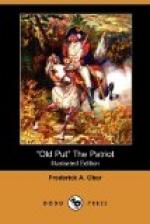“Good-night, you sweet lady,” he said. “You will never know how your kind heart has helped me to-night, nor can I express my gratitude for your spontaneous sympathy,” with which he kissed the fair hands, and went regretfully toward the door.
Moravia thought this the right moment to show a little further sentiment.
“Good-night, Henry,” she faltered. “It has been rather heaven for me—but I don’t think I’ll let you dine up here alone with me again—it—it might make my heart ache, too.” And then she dexterously glided to the door of her bed-room and slipped in, shutting it softly.
And Henry found himself alone, with some new fire running in his veins.
When Moravia, listening, heard his footsteps going down the passage, she clasped her hands in glee.
“I ‘shall never know’! ’My spontaneous sympathy’!—Oh! the darling, innocent babe! But I’ve won the game. He will belong to me now—and I shall make him happy. Ouida was most certainly right when she said, ’Men are not vicious; they are but children.’”
CHAPTER XXIII
Very early on Christmas morning, Lord Fordyce went down to the presbytere and walked with the Pere Anselme on his way to Mass. He had come to a conclusion during the night. The worthy priest would be the more fitting person to see Michael than he, himself; he felt he could well leave all explanations in those able hands—and then, when his old friend knew everything, he, Henry, would meet him and bring him to the Chateau of Heronac, and so to Sabine.
The Pere Anselme was quite willing to undertake this mission; he would have returned to his breakfast by then and would await Michael’s arrival, he told Henry. Michael would come from the station, twenty kilometers away, in Henry’s motor.
The wind had got up, and a gloriously rough sea beat itself against the rocks. The thundering surf seemed some comfort to Henry. He was unconscious of the fact that he felt very much better than he had ever imagined that he could feel after such a blow. Moravia’s maneuvrings and sweet sympathy had been most effective, and Henry had fallen asleep while her spell was still upon him—and only awakened after several hours of refreshing slumber. Then it was he decided upon the plan, which he put into execution as soon as daylight came. Now he left the old priest at the church door and strode away along the rough coast road, battling with the wind and trying to conquer his thoughts.
He was following Moravia’s advice, and replacing each one of pain as it came with one of pleasure—and the cold air exhilarated his blood.
Michael, meanwhile, in the slow, unpleasant train, was a prey to anxiety and speculation. What had happened? There was no clue in Henry’s dry words in the telegram. Had there been some disaster? Was Henry violently angry with him? What would their meeting bring? He had come in to the Ritz from a dinner party, and had got the telegram just in time to rush straight to the station with a hastily-packed bag, and get into an almost-moving train, and all night long he had wondered and wondered, as he sat in the corner of his carriage. But whatever had happened was a relief—it produced action. He had no longer just to try to kill time and stifle thought; he could do something for good or ill.




